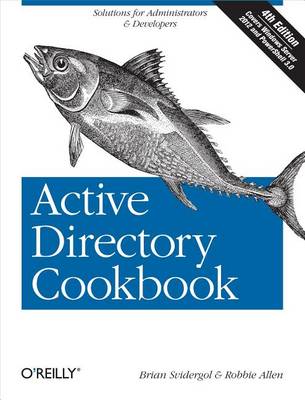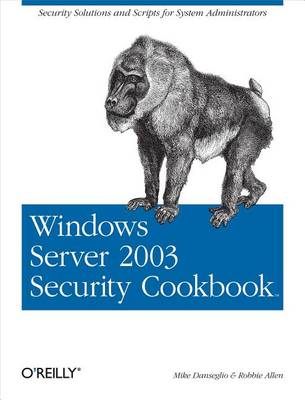Cookbooks (O'Reilly)
2 total works
If you need practical hands-on support for Active Directory, the new edition of this extremely popular Cookbook provides quick solutions to more than 300 common - and uncommon - problems you might encounter when deploying, administering, and automating Active Directory to manage users in Windows Server 2008 and Exchange 2007. With valuable input from Windows administrators, this updated version by Laura E. Hunter relies on experience to bring you sound recipes for the Lightweight Directory Access Protocol (LDAP), ADAM (Active Directory Application Mode), multi-master replication, Domain Name System (DNS), Group Policy, the Active Directory Schema, and many other features.
"Active Directory Cookbook" will help you: perform Active Directory tasks from the command line; use scripting technologies to automate Active Directory tasks; manage new Active Directory features, such as Read-Only Domain Controllers, fine-grained password policies, and more; create domains and trusts; locate users whose passwords are about to expire * Apply a security filter to group policy objects; check for potential replication problems; restrict hosts from performing LDAP queries; and, view DNS server performance statistics. Each recipe includes a discussion explaining how and why the solution works, so you can adapt the problem-solving techniques to similar situations. "Active Directory Cookbook" is ideal for any IT professional using Windows Server, particularly Active Directory administrators looking to automate their task-based solutions.
"Active Directory Cookbook" will help you: perform Active Directory tasks from the command line; use scripting technologies to automate Active Directory tasks; manage new Active Directory features, such as Read-Only Domain Controllers, fine-grained password policies, and more; create domains and trusts; locate users whose passwords are about to expire * Apply a security filter to group policy objects; check for potential replication problems; restrict hosts from performing LDAP queries; and, view DNS server performance statistics. Each recipe includes a discussion explaining how and why the solution works, so you can adapt the problem-solving techniques to similar situations. "Active Directory Cookbook" is ideal for any IT professional using Windows Server, particularly Active Directory administrators looking to automate their task-based solutions.
In the last few years, security has become a hot-button issue for IT organizations of all sizes. Accordingly, many of the security features that were either optional or suspect in Windows 2000 have become solid, effective fixtures in Windows Server 2003 - making it the most secure operating system Microsoft has ever produced. That is, if you know how to configure it properly. "The Windows Server 2003 Security Cookbook" wants to make sure that you do know how. Picking up right where its predecessor, the "Windows Server Cookbook", left off, this desktop companion is focused solely on Windows Server security. It teaches you how to perform important security tasks in the Windows Server 2003 OS, using specific and adaptable recipes. Each recipe features a brief description of the problem, a step-by-step solution, and then a discussion of the technology at work. Whenever possible, the authors even tell you where to look for further information on a recipe. The book is written in a highly modular format, with each chapter devoted to one or more technologies that Windows Server 2003 provides.
This approach allows you to look up a task or scenario that you want to accomplish, find that page, and read that particular recipe only. The topics include: system preparation and administration; protecting the computer at the TCP/IP level; applying security options to Active Directory; improving security on domain controllers; securing DHCP controllers; encrypting and signing network traffic using IPSec; and, patch management. If you're an intermediate or advanced system administrator who wants to feel secure when deploying Windows Server 2003 and its related services, then you don't want to be without the "Windows Server 2003 Security Cookbook".
This approach allows you to look up a task or scenario that you want to accomplish, find that page, and read that particular recipe only. The topics include: system preparation and administration; protecting the computer at the TCP/IP level; applying security options to Active Directory; improving security on domain controllers; securing DHCP controllers; encrypting and signing network traffic using IPSec; and, patch management. If you're an intermediate or advanced system administrator who wants to feel secure when deploying Windows Server 2003 and its related services, then you don't want to be without the "Windows Server 2003 Security Cookbook".

